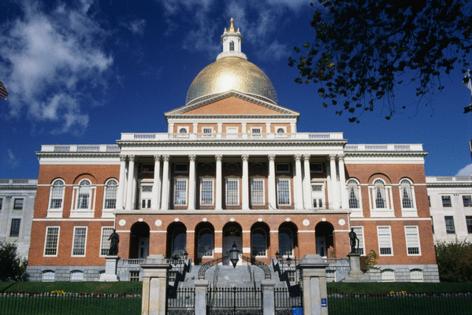Beacon Hill Democrats ship Gov. Healey budget accord that boosts reliance on surtax
Published in News & Features
Massachusetts lawmakers sent a $61 billion budget to Gov. Maura Healey Monday that requires residential brokers’ fees to be covered by the party that enlists those services and boosts the state’s reliance on a surtax on incomes over $1 million.
The votes to advance the budget marked the first time since 2016 that lawmakers have sent a spending plan to the governor before the start of the next fiscal year. But Massachusetts is still set to kick off fiscal 2026 without a budget in place because Healey gets 10 days to review the proposal.
The $61 billion budget accord top Democrats released over the weekend boosts overall spending by $3.3 billion over the last fiscal year, an increase that outpaces the rate of inflation and comes as budget writers are grappling with uncertainty spurred by President Donald Trump-fueled funding cuts.
But the budget does bring down spending by $1 billion compared to the fiscal year 2026 plan Healey released in January and by nearly $500 million compared to the versions the House and Senate put out earlier this year.
Massachusetts Taxpayers Foundation President Doug Howgate said Democrats’ decision to lower spending “is a positive step.”
“While I think the lowering of the bottom line … is a positive step, I would expect to see the Healey administration to reduce further to make sure that they feel comfortable as the fiscal year starts that we have a spending plan in place that’s accounting for at least some of the things we know we’re going to have to address, and buys us some room for things that we don’t know,” Howgate told the Herald.
Beacon Hill Democrats moved the budget agreement through both branches Monday as Congress was debating Trump’s controversial big bill of tax breaks and spending cuts. The federal proposal could have major impacts on the state budget in Massachusetts.
The vote to send the budget to the governor is the first time Beacon Hill Democrats have managed to get a budget to a governor before the July 1 start of the new year since they took final votes on the fiscal year 2017 budget in 2016. Massachusetts has not started a new fiscal year with a spending plan in place since 2010.
The compromise spending plan local lawmakers hashed out for the fiscal year that starts Tuesday is light on major policy initiatives compared to previous years.
But Massachusetts Democrats did send Healey language that requires any real estate broker fee to be paid by the party that reaches out to the broker, a move lawmakers said ensures that fee agreements worked out by landlords and brokers are not passed on to tenants.
Housing advocates cheered the move as one that would “end Massachusetts’ status as the last remaining state where renters are forced to cover the cost of a broker fee when they rent an apartment.”
Carolyn Chou, who leads the housing advocacy group Homes for All Mass, said the policy is “a long-overdue win for tenants, especially those who move frequently.”
“Consider someone who moves three or four times over the next decade; this reform could save them more than $10,000 in reduced moving costs over that time. It’s a common-sense step to ensure that renters are not forced to pay unnecessary costs to rent an apartment, and to reduce the steep cost of moving to a new home,” Chou said in a statement.
Massachusetts lawmakers also increased their reliance in the state budget on a 4% surtax on incomes over $1 million. Democrats have regularly looked to the billions of dollars brought in by the voter-approved surtax to pay for new programs in the transportation and education sectors.
House and Senate budget writers initially agreed to cap surtax spending in the fiscal year 2026 operating budget at $1.95 billion, but upped that threshold to $2.4 billion in the compromise they released over the weekend.
Howgate said the increase in surtax spending is likely “reflective of the fact that we’ve seen strong surtax questions in fiscal year 2025.”
“Increasing our reliance on the surtax at a time when economic uncertainty is heightened could prove to be a risky bet,” he said. “That’s an area where we could be a little overextended, and the more we spend in the operating budget from the surtax, the less we will have available to use in infrastructure investments.”
Paul Craney, a spokesman for the conservative Massachusetts Fiscal Alliance, said the budget “relies heavily on one-time revenue sources and a full drawdown of the surtax on high earners, which was originally sold to voters as dedicated funding for education and transportation.”
“Once again, Beacon Hill is using the income surtax as a slush fund for whatever they want, with no accountability to the taxpayers who were promised results. They’re pulling every trick in the book to keep growing government while avoiding the hard decisions,” Craney said in a statement.
Even though Democrats were able to hand Healey a budget before the start of the new fiscal year, Massachusetts is still likely to start fiscal 2026 without a full spending plan in place because the governor gets more than a week to review any proposal sent to her desk.
But the House and Senate were also in the process Monday of sending to Healey a $7.5 billion interim budget that covers state spending through the end of July. New programs and expansions to existing initiatives cannot take place while the state is operating on interim spending plans.
“But I wouldn’t anticipate any major disruption from the fact that it’s going to be a few days after July 1 when the actual budget is signed,” Howgate of the Massachusetts Taxpayers Foundation said.
_______
©2025 MediaNews Group, Inc. Visit at bostonherald.com. Distributed by Tribune Content Agency, LLC.







Comments